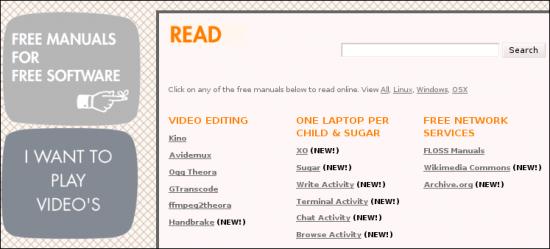




“Free software needs free reference manuals”, insists Free Software guru Richard Stallman[1]. The FLOSS Manuals project has risen to this challenge and produced a library of manuals for Free Software in a Free-Software-style collaborative manner.
The term “FLOSS” bundles the synonyms “libre” and “open source” with “free”. Free Software is software that you are free to use for whatever purpose you like; it is a matter of freedom, not price. Like freedom of speech or freedom of the press, the freedom to use software is important for a free society.
We can only exercise our freedom to use a piece of software if we understand how to use it. Even the best-designed software can be complex to operate and have a learning curve. If the instruction manuals that help people learn how to use that software are proprietary (not freely modifiable) and are expensive or inaccurate as a result, they can slow or even prevent people from understanding how to use it.
FLOSS Manuals provides manuals for a variety of Free Software. Graphics, video, audio, office, Internet, even GNU/Linux itself. An entire section is devoted to manuals for the One Laptop Per Child (OLPC) system. There is a selection of manuals for websites, including Wikimedia Commons, Archive.org and the FLOSS Manuals site itself. You can read these online or download PDF versions to read or print offline. Some manuals are available in different languages: English, Dutch and Farsi.
The project’s focus on the OLPC’s software is worthy of comment as one of the criticisms of the OLPC software from some adult commentators has been that the user interface and applications are so different from other systems that they are difficult to understand and use. Whether this is a fair criticism or not, they and everyone else now have a well-designed set of manuals to consult.
The website is a good example of a clean, warm 1950s television-age magazine-inspired web design and well laid out but friendly and informal. It could hardly be more user-friendly if the words “Don’t Panic” were printed in large letters. The manuals themselves are a good example of clean “default style” typography. The sections and subsections are separated and titled in a clear and unobtrusive style that provides context and guides the reader without drawing attention to itself.

The one curious feature of the manuals isn’t in their design or writing but in their licensing. They are licenced under the GNU General Public Licence (GPL). This is the licence that GNU, Linux and many other Free Software projects are licenced under, but it is designed for software rather than for text. The GNU project has produced a documentation licence, the GNU Free Documentation Licence (FDL), which is used by Wikipedia, among other projects.
The FDL is a controversial licence. It allows un-modifiable and non-removable advertising statements and political statements to be added to the instruction text of manuals. In practice, there has been little or no abuse of these features. But it can be a bone of contention for projects. The Creative Commons Attribution-ShareAlike licence would be a better choice, and Wikipedia may switch to it in the future, but it is still controversial with licence obsessives like the Debian Linux Legal discussion list.
FLOSS Manuals avoid these problems by using the GPL. Since the manuals are written using a Wiki, which makes getting the “source code” for them as easy as selecting a tab on the web page for each book, the fact that the GPL is designed to work with programs with source code isn’t a problem. It’s an unusual decision that is worth understanding the context of, though.
As well as versions that you can read online or download and print, FLOSS Manuals are publishing print versions of some of their manuals, including the Audacity and OLPC manuals. Print may seem environmentally unfriendly, slow and low-tech compared to online manuals. But physical books are useful if your software is in full-screen mode if you want to learn how to use your software during your commute on the way to use it, or if, like most people, you have better retention for the written word than for pixels on a screen.
Having a book to refer to alongside an OLPC laptop folded open at the right page or when the laptop is turned off is much more convenient than referring to the documentation on-screen or discovering how the system works through trial and error. The OLPC manuals are visually very appealing, maintaining the clean and child-friendly colourful symbolism of the OLPC website and user interface.
Producing books reflects FLOSS Manuals’ organization and maturity as a project, as does the diversity of the software being covered and the solid design of both the site and the manuals. Whether you are looking for a good resource to direct newbies to, looking to learn new software yourself (I’ll be trying to learn Blender again and downloading Alchemy based on their manuals here), or needing to demonstrate the existence of serious training materials when recommending Free Software for work or projects, FLOSS Manuals is an excellent resource for learning how to use free software.
[1] http://www.gnu.org/software/libtool/manual/libc/Free-Manuals.html
The text of this review is licenced under the Creative Commons BY-SA 3.0 Licence.